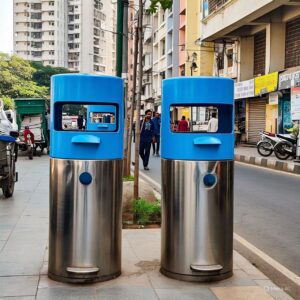Bangalore, India’s bustling tech capital, is known for its rapid urban growth and vibrant innovation. However, with this expansion comes an undeniable challenge — waste generation and disposal. As the population continues to grow, so does the city’s garbage problem. Yet, amid this concern, Bangalore is stepping up with innovative waste management initiatives and sustainable recycling practices aimed at protecting its environment and improving urban living.
In this article, we explore how Bangalore is transforming from a city battling garbage to one embracing a greener future through smart waste solutions, community participation, recycling technologies, and government-led initiatives.
Understanding the Waste Challenge in Bangalore
To begin with, Bangalore generates over 4,000 tonnes of solid waste daily. This includes household waste, industrial refuse, electronic scrap, and construction debris. For years, poor segregation and limited landfill space worsened the situation. Overflowing dump yards and burning garbage became common sights.
Consequently, the health and environmental risks escalated. Air quality declined. Groundwater got polluted. Citizens raised concerns. Recognizing the urgency, the Bruhat Bengaluru Mahanagara Palike (BBMP) — the city’s municipal body — began launching comprehensive waste management reforms.
The Shift Towards Segregation at Source
One of the most significant turning points in Bangalore’s waste strategy has been enforcing segregation at source. This initiative mandates households, offices, and institutions to separate their waste into three categories:
-
Wet waste (biodegradable)
-
Dry waste (recyclable materials)
-
Reject waste (hazardous or non-recyclables)
By making waste separation compulsory, Bangalore has drastically improved its collection efficiency. Moreover, waste segregation has helped divert biodegradable materials to composting units and biogas plants, reducing the pressure on landfills.
Importantly, local communities and resident welfare associations (RWAs) have supported this mission through awareness campaigns and training programs.
Decentralized Waste Processing Units
Instead of relying solely on large landfills, Bangalore adopted a decentralized waste management model. This involves setting up local waste processing units across neighborhoods. These include:
-
Composting centers for organic waste
-
Dry waste collection centers (DWCCs) for recyclables
-
Bio-methanation plants for energy recovery
This localized approach not only minimizes transportation costs and emissions but also generates employment for waste workers and encourages community ownership of waste solutions.
Involving the Informal Sector
Another crucial pillar of Bangalore’s waste journey is the integration of informal waste workers. The city has over 20,000 waste pickers, many of whom previously worked under unsafe, unregulated conditions.
Through partnerships with NGOs like Hasiru Dala and Saahas, BBMP has begun registering waste workers, offering them ID cards, safety gear, and formal contracts. These efforts give waste pickers dignity, fair wages, and a central role in the recycling chain.
Furthermore, this model enhances material recovery, especially for dry waste like paper, plastic, glass, and metal, feeding directly into Bangalore’s circular economy.
Recycling Drives and Citizen Participation
Citizen engagement has been instrumental in the city’s waste reforms. Apartment complexes, schools, and offices regularly host:
-
E-waste drives
-
Plastic collection campaigns
-
Composting workshops
-
Zero-waste community challenges
Moreover, mobile apps like “Swachhata App” and “My Clean City” allow users to report garbage pile-ups, track pickup schedules, and request cleanup services. These digital tools foster accountability, transparency, and public involvement.
The Rise of Startups in Waste Tech
Bangalore’s entrepreneurial spirit extends into waste management. Several eco-startups are innovating solutions in recycling, upcycling, and green logistics.
Notable players include:
-
Daily Dump – designs home composters to reduce kitchen waste
-
Recykal – digitizes the waste chain for recyclers, generators, and aggregators
-
Civic Studios – creates gamified awareness tools for cleaner neighborhoods
These startups contribute to building a green economy by turning waste into opportunity, jobs, and innovation.
E-Waste Management: Tackling the Tech Trash
As a tech-heavy city, Bangalore produces substantial electronic waste (e-waste) — discarded phones, laptops, batteries, and gadgets. Left unmanaged, this waste can leak harmful toxins into the environment.
Thankfully, government-approved e-waste recyclers and collection centers now operate across the city. Campaigns encourage residents to deposit e-waste at designated points rather than tossing it with household garbage.
Additionally, companies in the IT sector are now more mindful of product life cycles, repairability, and recycling commitments, helping reduce their environmental footprint.
Plastic Waste Control and Alternatives
Plastic pollution is another serious concern. Bangalore has implemented strict bans on single-use plastics like carry bags, cups, and straws. Enforcement teams conduct raids and impose penalties on violators.
Simultaneously, there is a push toward eco-friendly alternatives such as cloth bags, compostable packaging, and reusable containers. Local businesses are incentivized to adopt sustainable packaging practices.
These regulations, paired with citizen awareness, contribute significantly to reducing urban plastic pollution.
Policy Framework and Future Plans
Bangalore’s waste reform is guided by frameworks like the Solid Waste Management Rules 2016, Karnataka Plastic Ban, and the Swachh Bharat Mission.
Looking ahead, BBMP plans to:
-
Expand door-to-door collection coverage
-
Upgrade waste processing infrastructure
-
Promote waste-to-energy technologies
-
Build more material recovery facilities (MRFs)
-
Strengthen monitoring and data analytics
These future goals aim to transform Bangalore into a model zero-waste city.
Challenges Along the Way
Despite progress, several hurdles remain:
-
Not all households follow segregation
-
Landfill fires and leachate leakage continue
-
Public-private partnerships need better coordination
-
Citizen awareness varies across income groups
To overcome these, sustained efforts in education, policy enforcement, infrastructure investment, and technology integration are essential.
Conclusion: Toward a Cleaner, Greener Bangalore
In conclusion, Bangalore’s waste management journey is a work in progress, but one that reflects determination, innovation, and community spirit. From segregating waste to empowering waste workers, from composting at home to recycling tech junk — the city is rewriting its garbage story.
As urban populations rise, sustainable waste management becomes not just a civic duty but a survival necessity. Bangalore’s efforts offer a blueprint for other Indian cities aiming for cleaner futures.
Indeed, when citizens, government, and technology come together, a zero-waste vision is within reach.


